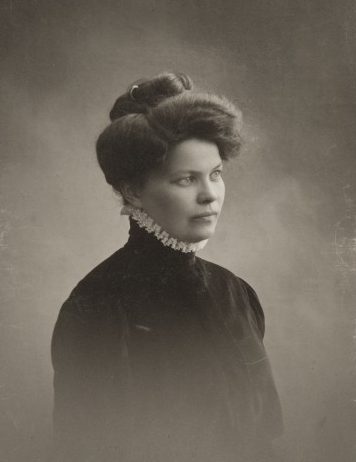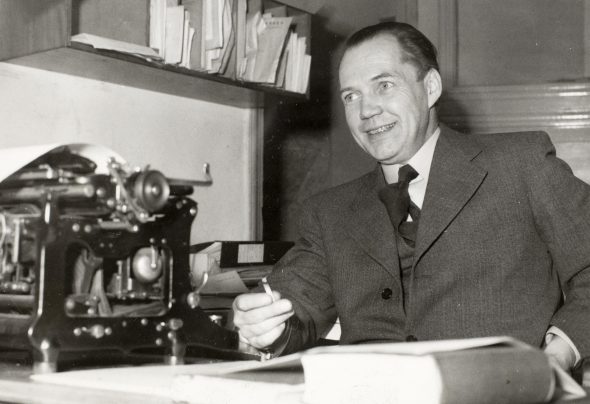Search results for "kalevala"
Lemminkäinen unfazed
30 September 2000 | Archives online, Fiction, poetry, Prose
An English translation by Anselm Hollo of Runo XI from Kalevala 1999, Kai Nieminen’s new translation of the national epic (1849), into contemporary Finnish. Interview with Kai Nieminen by Anselm Hollo
But now it is time to tell about Lemminkäinen, a.k.a. Ahti the Islander. Young Ahti was handsome and cheerful. His mother raised him on the shores of a headland where he went fishing, ate fish and grew up strong smart and straight. But his character had a flaw: a womanizer is what he became, our Lemminkäinen (also known as Wandering Mind). He spent his days chasing the girls, his nights making love to them.
Underage
30 June 1999 | Archives online, Fiction, Prose
A short story from Leiri (‘Camp’, Otava 1972). Interview by Maija Alftan
In the dark and wet the tram seemed like a stale-smelling and badly-lit waiting room at a country station, its Post Office Savings Bank advertisement set out of reach of vandalising underage hands. The conductress was two-thirds out of sight behind her desk: a small person. I glanced at the time stamped on my ticket. My only timepiece.
It was the time of day when you can see your own face in the window and through to the outside as well. I stood in the doorway, hanging onto the bar. As the tram turned into the narrow canyon of Aleksanterinkatu, the street seemed like some kind of cellar. Fantastic, how the world darkens at the end of the year. And then, when it’s at its darkest, everything goes totally white. The low-slung cars seemed to be slinking round the tram’s feet. More…
Happy birthday to us!
13 February 2014 | Letter from the Editors

Picture: Wikipedia
It’s been five years since Books from Finland went online, and we’re celebrating with a little bit of good news.
In the past year, the number of visits to the Books from Finland website has grown by 11 per cent. The number of US and UK readers grew by 29 per cent, while the number of readers in Germany – stimulated perhaps by the publicity Finnish literature is attracting as a result of its Guest Country status at this year’s Frankfurt Book Fair – increased by an astonishing 59 per cent.
We’re chuffed, to put it mildly – and very thankful to you, dear readers, old and new. More…
Kullervo
31 March 1989 | Archives online, Drama, Fiction
An extract from the tragedy Kullervo (1864). Introduction by David Barrett
The plot of the Kullervo story as told in the Kalevala: Untamo defeats his brother Kalervo’s army, and Kalervo’s son Kullervo is born a slave. Untamo sells him as a young child to llmarinen whose wife, the Daughter of Pohjola, makes the boy a shepherd and bakes him a loaf with a stone inside it. Kullervo takes his revenge by sending home a flock of wild animals, instead of cattle, who tear her to pieces. He flees, and discovers that his parents and two sisters are alive on the borders of Lapland. He finds them, but one of his sisters is lost. Life in the family home is unhappy: Kullervo fails in all the tasks his father sets him. On his way home one day he finds a girl in the forest whom he abducts in his sledge and seduces. It turns out the girl is his lost sister, who drowns herself when she learns that Kullervo is her brother. Kullervo sets out to revenge himself on Untamo; he kills and destroys. When he returns home, he finds the house empty and deserted, goes into the forest and falls on his sword.
ACT II, Scene 3
Kalervo’s cottage by Kalalampi Lake. It is night-time. Kimmo, seated by a fire of woodchips, is mending nets. More…
Sound and meaning
20 January 2012 | Essays, Non-fiction
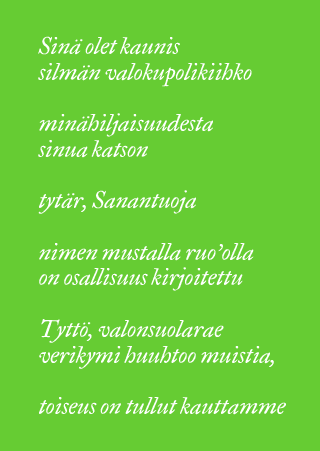
Harri Nordell’s poem from Huuto ja syntyvä puu (‘Scream and tree being born’, 1996)
Translating poetry is natural, claims Tarja Roinila; it is a continuation of writing it, for works of poetry are not finished, self-sufficient products. But is the translator the servant of the meaning – or of the letter?
I am sitting in a cafe in Mexico City, trying to explain in Spanish what valokupolikiihko, ‘light-cupola-ecstasy’, means. And silmän valokupolikiihko, ‘the light-cupola-ecstasy of the eye’.
I take to praising the boundless ability of the Finnish language to form compound words, to weld pieces together without finalising the relationships between them, never mind establishing a hierarchy: the eye is a light-cupola, the eye is ecstatic about light-cupolas, light creates cupolas, the cupola lets out the light, the eye, in its ecstasy, creates a light-cupola. More…
Why translate?
28 January 2015 | Essays, Non-fiction
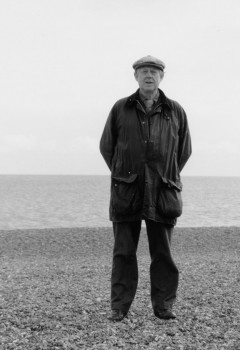
Down by the sea: Herbert Lomas in Aldeburgh. – Photo: Soila Lehtonen
‘People do not read translations to encourage minor literatures but to rediscover themselves in new imaginative adventures‚’ says the poet and translator Herbert Lomas in this essay on translation (first published in Books from Finland 1/1982). ‘Translation is a thankless activity,’ he concludes – and yet ‘you have the pleasure of writing without the agony of primary invention. It’s like reading, only more so. It’s like writing, only less so.’ And how do Finnish and English differ from each other, actually?
Any writer’s likely to feel – unless he’s a star, a celebrity, a very popular and different beast – that the writer is a necessary evil in the publisher’s world, but not very necessary. How much more, then, the translator from a ‘small’ country’s language.
Why do it? The pay’s absurd, you need the time for your own writing, it’s very hard to please people, and translation is, after all, the complacent argument goes, impossible. I’m convinced by all these arguments, and really I can’t afford to go on; but I don’t regret what I’ve done and, looking back, I can find two reasons for translating Finnish writing, one personal, the other cultural. More…
Monikulttuurisen maamme kirja. Suomen kielen ja kulttuurin lukukirja [The book of our multicultural land. A reader of Finnish language and culture]
23 October 2014 | Mini reviews, Reviews
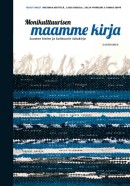 Monikulttuurisen maamme kirja. Suomen kielen ja kulttuurin lukukirja
Monikulttuurisen maamme kirja. Suomen kielen ja kulttuurin lukukirja
[The book of our multicultural land. A reader of Finnish language and culture]
Toim. [Ed. By] Marjukka Kenttälä, Lasse Koskela, Saija Pyhäniemi, Tuomas Seppä
Helsinki: Gaudeamus, 2013. 252 pp.
ISBN 978-952-495-253-8
€ 34, hardback
This book opens a fascinating, often entertaining and eminently readable perspective on Finnishness and Finnish culture. It contains short Finnish texts supplied with introductions, from the Kalevala and the writings of Finland’s national author Aleksis Kivi to the present day. There are also Finnish translations of the work of Finnish-Swedish authors. The older texts are drawn from the literary ‘canon’, in works by J.L. Runeberg, Z. Topelius, Juhani Aho, Maria Jotuni, Eino Leino, F.E. Sillanpää, Väinö Linna and Tove Jansson. Among the excerpts that date from more recent times there are even pop and rock lyrics. The writing often throws light on some aspect of Finnishness, sometimes with a critical or ironic note. There is also writing by immigrants. Interspersed with the literary examples are short essays giving the views of experts on subjects like Finnish history, language or sport. Some of the texts conclude with a glossary of unfamiliar words and terms. The explanations are arranged in order of their appearance in the text: for the casual reader seeking the meaning of a word, alphabetical order would have been more practical, though even then some phrases might have remained unnoticed.
Translated by David McDuff
Becoming Finland
23 May 2013 | Reviews
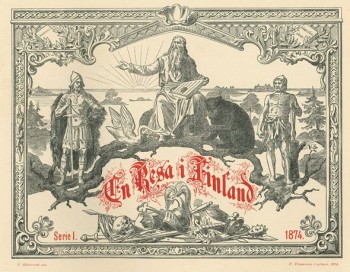
Imaginary heroes: the title page of En resa i Finland. Illustration by C.E. Sjöstrand (1828–1906)
Zacharias Topelius
En resa i Finland
[A journey in Finland (1873)]
Helsinki: Svenska litteratursällskapet i Finland, 2013. 173 p., ill.
Utgivare [Editor]: Katarina Pihlflyckt
ISBN 978-951-583-260-3
€38, hardback
(Stockholm: Atlantis förlag, 2013. ISBN 978-91-7353-616-5)
The birth of Finland as a country came as a surprise to those who lived there.
It was created by Napoleon and Alexander I, becoming a reality following Russia’s victory over Sweden in the so called Finnish War. In 1809 Alexander exalted Finland as ‘a nation among nations’, however the new nation still needed to feel like a nation. The Russian rulers supported gentle and non-political nationalism in Finland, in the hope that it would mentally distance the country from Sweden. In this tranquillity, the sense of community they had envisioned grew in Finland.
For this, there were three key factors, all of which stemmed from the 1830s. Elias Lönnrot published the Kalevala, the national epic, proving that Finnish mythology and culture did indeed exist. The poet J.L. Runeberg (who would later become known as the national poet) gave Finland an appearance that was an ideology. He depicted a poor, pious and simple people, a harsh and beautiful wilderness, and with his poems he described the Finnish War, that Finland had lost, as a heroic battle of the people, fought for Finnish values. More…

